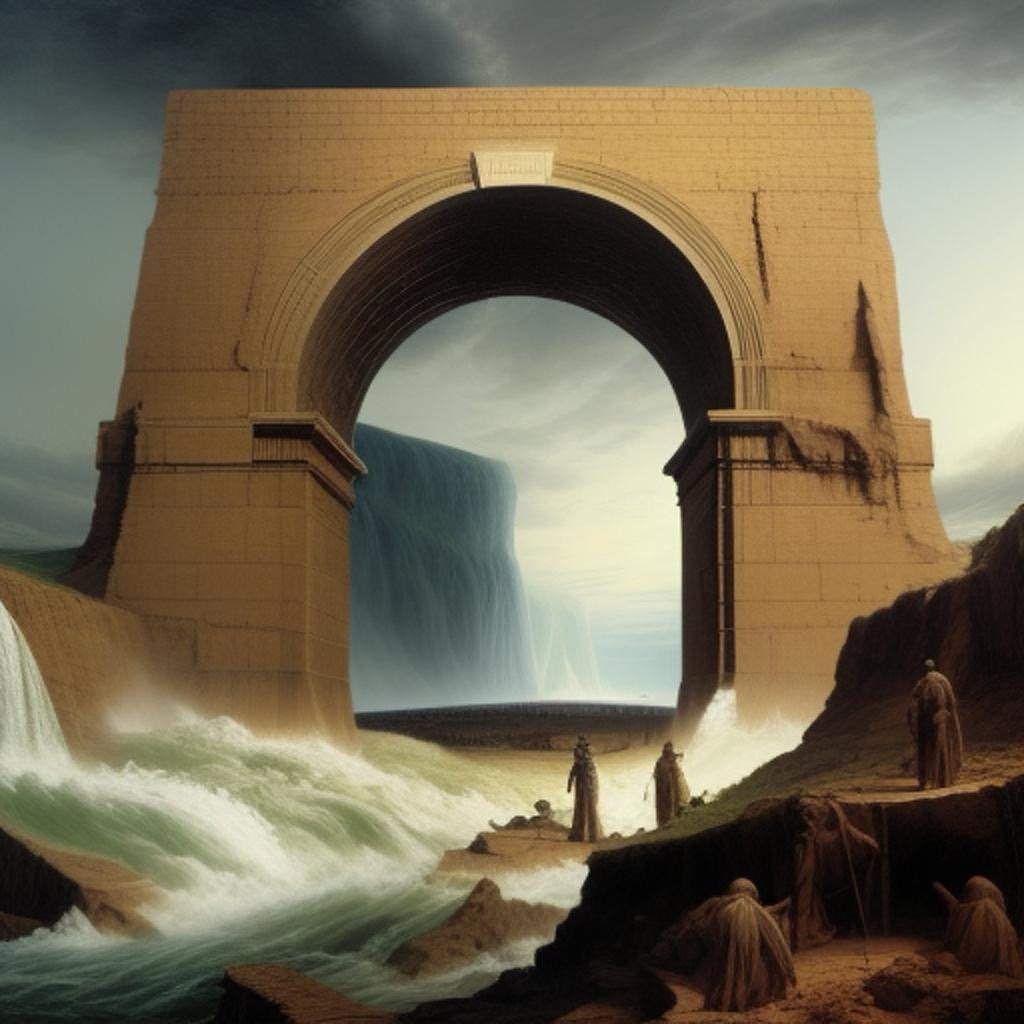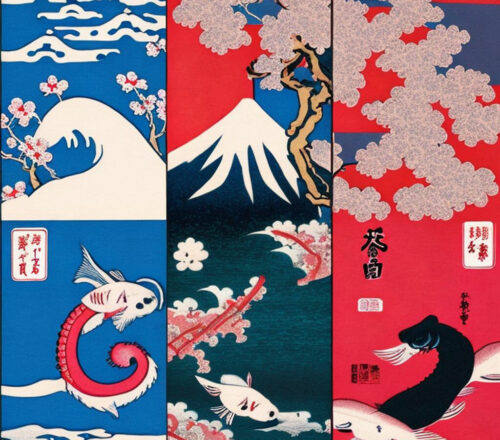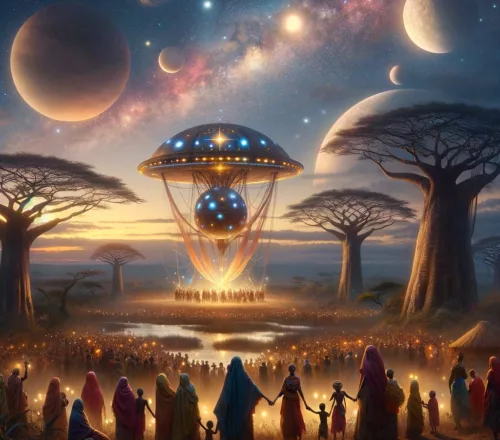
Table of Contents
Ancient texts and narratives that refer to a great flood or deluge
There are several ancient texts and narratives from different cultures and civilizations that refer to a great flood or deluge. These accounts often share similarities with the biblical story of Noah’s Ark and the flood. Here are a few notable examples:
- Epic of Gilgamesh (Sumerian and Babylonian): The Epic of Gilgamesh is one of the earliest known works of literature and contains a flood narrative very similar to the biblical account of Noah’s flood. In the epic, the gods decide to flood the earth to destroy humanity, but the god Ea warns Utnapishtim, who builds an ark to save himself, his family, and animals.
- Atrahasis Epic (Babylonian): The Atrahasis Epic, another Mesopotamian text, also describes a great flood sent by the gods to reduce human population. Atrahasis builds an ark and survives the flood with animals.
- The Ziusudra Epic (Sumerian): This Sumerian text predates the Epic of Gilgamesh and contains a flood story involving a hero named Ziusudra. Like in the later Gilgamesh epic, Ziusudra is warned by the god Enki to build a boat to survive the impending flood.
- The Eridu Genesis (Sumerian): This text, also known as the Sumerian flood story, predates the above-mentioned texts and tells of a great flood sent by the gods to destroy humankind. The Sumerian king Ziusudra is the hero who survives by building a boat.
- The Hindu Flood Myth (Hindu): In Hindu mythology, there is a story of a great flood called the “Deluge of Manu” or the “Mahapralaya.” The god Vishnu takes the form of a fish to warn Manu, the progenitor of humanity, about the impending flood. Manu builds a boat and is saved along with the Saptarishi, the seven great sages.
- The Ogyges Myth (Greek): In Greek mythology, the Ogyges myth tells of a great flood during the time of Ogyges, an early king of Thebes. While less detailed than some other flood narratives, it is one of the early accounts of a deluge in European mythology.
These are just a few examples of flood narratives from different cultures and time periods. The similarities between these stories raise intriguing questions about the potential shared cultural memories or experiences that inspired them. They also highlight the universality of flood narratives in human mythology and storytelling.
A comparison of the flood narratives from various cultures, including the biblical account. Please note that while there are similarities, there are also significant differences in these stories.
Here’s a comparison in a table format
| Culture | Text | Hero/Protagonist | Divine Warning | Construction of Ark/Boat | Survivors | Divine Purpose/Reason |
| Sumerian | Eridu Genesis | Ziusudra | Yes (Enki) | Wooden boat | Ziusudra, animals | To end human noise and overpopulation |
| Sumerian/Babylonian | Atrahasis Epic | Atrahasis | Yes (Enki) | Circular boat | Atrahasis, animals | To reduce human population |
| Sumerian/Babylonian | Epic of Gilgamesh | Utnapishtim (Noah) | Yes (Ea) | Rectangular boat | Utnapishtim, animals | To wipe out humanity |
| Hindu | Mahabharata | Manu | Yes (Matsya Avatar) | Ark with a horned fish | Manu, Saptarishi | To save humanity from a deluge |
| Greek | Ogyges Myth | Ogyges | No | Not specified | Ogyges | Unknown |
| Hebrew | Genesis (Bible) | Noah | Yes (God/Yahweh) | Ark with specific dimensions | Noah, family, animals | To cleanse the earth of wickedness |
The biblical flood narrative in Genesis is one of the most well-known and extensively detailed versions. While there are common elements across these stories, such as divine warnings, the construction of an ark or boat, and the preservation of humans and animals, there are also significant variations in the narratives, including the reasons given for the flood and the specific details of the accounts. These differences reflect the unique cultural and religious contexts in which each story was developed.
Timeline for the flood narratives in ancient texts
Determining an exact timeline for the flood narratives in ancient texts is challenging because these stories often exist in mythological or legendary contexts rather than historical records. Scholars have attempted to place these events within a historical framework, but there is no consensus on precise dates. Here’s a general overview of the historical context for some of these narratives:
- Sumerian Flood Stories: The Sumerian flood stories, including the Eridu Genesis and Atrahasis Epic, are among the earliest flood narratives and are believed to date back to the third millennium BCE. However, they do not provide specific historical dates or timelines.
- Epic of Gilgamesh: The Epic of Gilgamesh, which contains a flood narrative, is dated to the Old Babylonian period (around 1800 BCE), but the narrative itself likely has earlier origins. Again, it does not offer precise historical dating.
- Hindu Flood Myth: The Mahabharata, which includes the story of Manu’s flood, is a complex epic with uncertain dating. It is generally believed to have been composed over several centuries, with parts of it dating back to around 400 BCE. The flood narrative itself may have even earlier origins within Hindu mythology.
- Greek Ogyges Myth: The Greek Ogyges myth is one of the more obscure flood stories, and it lacks a specific historical context or dating.
- Hebrew Biblical Flood: The biblical account of the flood is found in the Book of Genesis. Scholars debate the dating of this narrative, with various estimates ranging from the 17th to the 19th centuries BCE. The biblical narrative places the flood during the time of Noah.
It’s important to note that these narratives are often symbolic or mythological in nature, and their dating is based on interpretations of the texts and archaeological evidence rather than concrete historical records. As a result, the exact timing of the events described in these flood narratives remains a subject of scholarly debate and interpretation.
Table summarizing the general historical context for the flood narratives in various cultures
| Culture | Text | Approximate Date or Period |
| Sumerian | Eridu Genesis | Third Millennium BCE |
| Sumerian/Babylonian | Atrahasis Epic | Third Millennium BCE |
| Sumerian/Babylonian | Epic of Gilgamesh | Old Babylonian Period (around 1800 BCE) |
| Hindu | Mahabharata | Composition over centuries, parts dating back to around 400 BCE |
| Greek | Ogyges Myth | No specific historical context |
| Hebrew | Genesis (Bible) | Debate over dating, estimates ranging from 17th to 19th centuries BCE |
These dates and periods are approximate, and there is variability in scholarly interpretations. The narratives often have mythological and symbolic elements, making it challenging to pinpoint precise historical dates.
Scientific view and interpretation of these dates
From a scientific perspective, dating ancient events like the flood narratives mentioned in various cultures can be challenging due to the lack of direct empirical evidence and the presence of mythological and symbolic elements in these accounts. Scientific methods for dating events primarily rely on archaeological and geological evidence. Here’s how the scientific view and interpretation of these dates typically unfold:
- Carbon Dating: One of the primary scientific methods for dating ancient materials is radiocarbon dating (carbon-14 dating). This method can provide estimates for the age of organic materials, such as wood or plant remains. However, it has limitations and may not apply to events or objects that do not contain organic materials.
- Archaeological Context: Scientific dating often involves establishing the chronological context of archaeological findings. Archaeologists examine the layers of sediment and the artifacts found within them to determine relative dates and sometimes establish broader historical timelines.
- Astronomical Dating: Some ancient texts, including Hindu texts, contain references to celestial events. Astronomical calculations can be used to identify specific astronomical events mentioned in these texts and, in some cases, provide approximate dates.
- Cultural and Linguistic Analysis: Scientific analysis extends beyond carbon dating to linguistic and cultural studies. Researchers examine linguistic changes and cultural developments to establish approximate timeframes for the composition of texts.
- Geological Evidence: In the case of flood narratives, geological evidence may be explored to identify potential large-scale flooding events. However, correlating specific floods to the events described in ancient texts is a complex and often speculative process.
It’s important to note that while scientific methods can help establish historical timelines, they may not always provide precise dates for events described in ancient narratives. Additionally, there may be variations in interpretations among scholars. The dating of events mentioned in mythological and religious texts often involves a blend of scientific analysis, historical research, and scholarly debate.
Ultimately, scientists and researchers work with available evidence to construct plausible timelines, but there can be a degree of uncertainty due to the nature of these ancient narratives and the limitations of scientific dating methods. The dating of these events is an ongoing area of study and exploration in the fields of archaeology, history, and comparative mythology.
And regarding the deluge?
The scientific interpretation of a global or catastrophic flood, such as the biblical Deluge or other similar flood narratives from different cultures, tends to be more skeptical due to the lack of compelling geological evidence for a worldwide, catastrophic flood event within the timeframes suggested by these narratives. Here are key points regarding the scientific view of the Deluge:
- Geological Evidence: Geologists have extensively studied the Earth’s geological record, looking for evidence of a massive, global flood. While regional and local floods have left their marks in the geological record, there is no widespread evidence of a single, global flood that matches the descriptions found in flood narratives.
- Ice Core and Sediment Analysis: Ice core samples and sediment layers from various parts of the world provide a detailed record of climate and environmental changes over thousands of years. These records do not show sudden, catastrophic global flooding events.
- Sea Level Changes: The melting of ice sheets and changes in sea levels over millennia have occurred gradually, rather than as a sudden event. The biblical narrative of a worldwide flood describes a rapid rise and fall of water levels.
- Lack of Historical Records: Beyond the biblical and mythological accounts, there is a notable absence of contemporary historical records or accounts from other civilizations that would corroborate a global flood event.
- Hydrology and Feasibility: Scientists have raised questions about the feasibility of a global flood, including the challenges of the massive amount of water required, where it would come from and go afterward, and the ecological impact it would have on the planet.
- Local Flood Hypotheses: Some researchers propose that the flood narratives may be based on memories of smaller, regional floods that were later mythologized into global catastrophes. These local flood hypotheses suggest that while floods did occur, they were not on a global scale.
In summary, from a scientific perspective, there is limited support for the occurrence of a worldwide, catastrophic flood as described in many ancient flood narratives, including the biblical Deluge. While local and regional floods are well-documented in Earth’s history, evidence for a single, global event remains elusive, and many scientists view these narratives as reflecting cultural and mythological interpretations of local flood events. Scientific inquiry continues, and new discoveries may shed further light on these ancient stories and their potential historical origins.
Shop Corner
The flood narratives on Amazon
Enjoy your exploration of these fascinating narratives! ????
Sources openai Language models, aitrot, picsart and mib
Take time to learn
Invest in your future
Embark on a journey into the realm of affiliate marketing and craft your own website within a vibrant, supportive community. Join me in this adventure, where you can begin as a free starter and stay as long as you desire. Enjoy complimentary hosting and foundational teachings to set you on your path. For those with advanced skills, opportunities to elevate your expertise await. Take a moment to explore and witness the magic for yourself!




